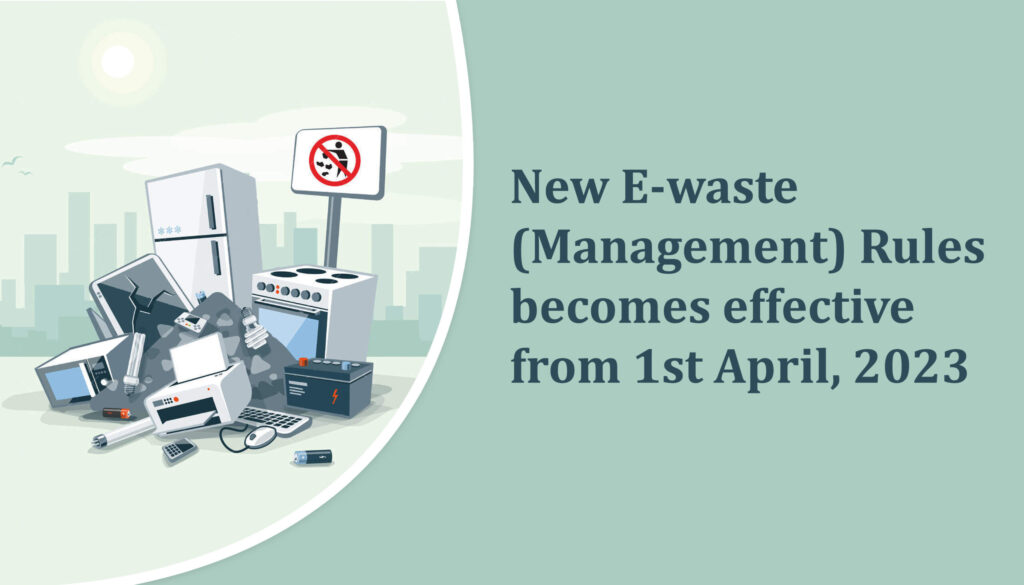New E-waste (Management) Rules becomes effective from 1st April, 2023

The new rules to manage e-waste, i.e., E-waste (Management) Rules, 2022 (“new Rules”) have become effective from 1st April, 2023. Though the Ministry of Environment, Forest & Climate Change issued the new Rules in November, 2022, it was made effective from April 2023. These new Rules introduce recycling targets in the extended producer responsibility (“EPR”) plan. The EPR mechanism under these rules provides annual e-waste recycling targets to producers for proper recycling and safe disposal.
Highlights of Changes
Scope & Definitions
-
These new Rules only apply to manufacturers, producers, refurbishers, dismantlers, and recyclers (“MPRDR”) of e-waste, whereas E-Waste. (Management) Rules, 2016 (“old Rules”) additionally covered dealers, consumers, bulk consumers, and collection centres.
-
The new Rules now define e-waste to include discarded solar panels and simplify the definition of bulk consumer to include any entity that used at least one thousand listed electrical or electronic equipment units in a financial year, including e-retailers.
-
Under the new Rules, EPR has been redefined to mean the responsibility of electrical or electronic equipment producers to meet recycling targets through registered e-waste recyclers for environmentally sound waste management. The producer definition has also been expanded.
Registration requirements
The old Rules required the manufacturer, producer, refurbisher, and recycler (“MPRR”) of e-waste to obtain authorization from State Pollution Control Board (“SPCB”), but the new Rules require MPRR to register on a portal developed by Central Pollution Control Board (“CPCB”) instead. Now, the MPRR cannot operate without this registration and cannot also deal with any other unregistered MPRR.
Simplifying regulations for ‘bulk consumers’
Under the old Rules, private and public companies as well as multinational organizations were considered ‘bulk consumers’, and they had to file an annual return and keep records of e-waste generated. However, the new Rules have eliminated these requirements.
Introducing a recycling certificate
The new Rules have introduced the EPR recycling certificate, which can be purchased online by producers to fulfil their recycling targets. These certificates, issued by CPCB, will be valid for 2 years from the end of the financial year they were generated in.
Introducing a refurbishing certificate and deferred liability
Further, the new Rules introduced the concept of deferred liability, allowing refurbishers to issue refurbishing certificates for a specific quantity of refurbished products. Producers can buy these certificates to defer their EPR for the corresponding amount of e-waste, which will be added to their EPR target once the extended life of the refurbished product has ended.
Penalties added and scope widened
The new Rules include provisions for environment compensation and prosecution under Section 15 of the Environ Protection Act, which is a new addition compared to the relevant provisions of the old Rules. The scope of imposing penalty has also been widened to include entities aiding or abetting the violation of the Rules.
Conclusion
The new Rules of 2022 are set to improve the process of managing e-waste in India by giving special attention to recycling. Now, let us see how far it becomes effective in handling and reducing the enormous volume of e-waste produced and disposed of indiscriminately making it environmentally challenging.
In one of our earlier blogs, we have covered how the new rules are going to change the regulatory regime. You can read our earlier blog ‘Battery Waste Management Rules, 2022 – Changes in the regime’ to learn more.
Interestingly, due to the changes in the E-Waste (Management) Rules 2022, there are more than 50 compliances that have changed in our Compliance Management Tool, Komrisk repository. As the regulatory landscape continues to evolve rapidly, it’s crucial to stay ahead of the curve with a comprehensive and robust compliance management system in India.
At Lexplosion Solutions, we understand the challenges of navigating complex compliance requirements and staying compliant. That’s why we offer a free consultation to help you adapt your compliance management system to the new changes brought by the E-Waste (Management) Rules 2022.
Don’t let compliance be a burden on your business. Let our powerful Compliance Management Tool, powered by cutting-edge technology and legal expertise, help you stay compliant and focus on your core business operations. Contact us today to learn more about how we can support your compliance journey.
Written by: Dwaipayan Das
Co-authored by: Amiya Mukherjee
Disclaimer
All material included in this blog is for informational purposes only and does not purport to be or constitute legal or other advice. This blog should not be used as a substitute for specific legal advice. Professional legal advice should be obtained before taking or refraining from an action as a result of the contents of this blog. We exclude any liability (including without limitation that for negligence or for any damages of any kind) for the content of this blog. The views and opinions expressed in this blog are those of the author/(s) alone and do not necessarily reflect the official position of Lexplosion Solutions. We make no representations, warranties or undertakings about any of the information, content or materials provided in this blog (including, without limitation, any as to quality, accuracy, completeness or reliability). All the contents of this blog, including the design, text, graphics, their selection and arrangement are the intellectual property of Lexplosion Solutions Private Limited and/or its licensors.
ALL RIGHTS RESERVED, and all moral rights are asserted and reserved.